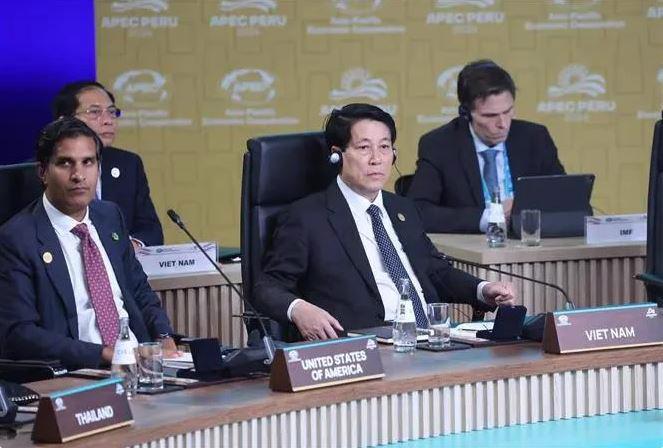Addressing the 31st APEC Economic Leaders' Meeting in Lima, Peru, on November 16 (local time), Vietnamese President Luong Cuong noted that while the global economic landscape is fraught with challenges and uncertainties, it is equally illuminated by the presence of significant opportunities, according to a report from the Vietnam News Agency.
The Vietnamese leader pointed out three factors that formulated such a context of the global economic landscape.
First, geopolitical conflict, trade friction and macro-level instability have reduced global growth prospects. Yet the Asia-Pacific economies have been able to maintain a stable growth trajectory, and remain the engine and driver of global growth.
Secondly, despite the rising tide of protectionism, supply chain disruptions, and polarization, there is a strong demand for strengthened international economic cooperation and integration.
Third, development and digital gaps, and global environmental issues continue to be our top challenges. Yet the development of transformative technologies and the increasingly profound and comprehensive digitization and green transition are bringing about new and innovative solutions and opportunities for cooperation.
In this context, the Vietnamese President proposed the following lines of action:
First, continue to advance trade and investment liberalization, and strengthen the rules-based multilateral trading system. We must cultivate and sustain vibrant economic linkages, facilitating the seamless flow of finance, technology, knowledge, and labor across borders. Establishing robust and resilient supply chains is essential while making decisive strides towards realizing a Free Trade Area of the Asia-Pacific.
Second, expedite cooperation programs and initiatives aimed at inclusive growth and technology. We must position people at the forefront of digital transformation and green transition. It is crucial to tackle the digital divide and prioritize support for vulnerable communities in remote regions, ensuring they not only access but also benefit from digital innovations. This requires substantial investment in green and digital infrastructure, alongside collaborative efforts to disseminate cutting-edge technological applications in addressing global challenges, particularly climate change.
Third, continually enhance global institutions and governance. We must advance APEC's structural reform and improve its institutions to create an agile, adaptive, forward-thinking entity capable of spearheading new growth avenues. Expanding technical support and capacity-building projects for developing countries is vital. We should also incentivize the participation of businesses and communities, who are drivers and beneficiaries of APEC’s cooperation. In pursuing these goals, Viet Nam is actively collaborating with APEC partners on the APEC Structural Reform Agenda for 2026-2030 to boost its operational effectiveness.
The Vietnamese leader then highlighted the role of APEC, noting that over the past 35 years, APEC has demonstrated its crucial role in the regional cooperation architecture, connecting the world's economic and technological hubs and leading the way in harnessing transformative development trends for the benefit of all our peoples.
“The documents adopted at this Summit, including proposals from our host country, Peru, serve as a strong testament to the unwavering commitment of APEC economies to concerted action in addressing shared challenges, capitalizing on emerging opportunities, and shaping the trajectory of regional and global cooperation,” he said.
As an active and responsible member in the international community, Vietnam will work closely with APEC members to translate the Forum’s vision and goals into tangible outcomes; and building upon the achievements of previous APEC years, Vietnam is preparing for APEC 2027 towards a peaceful, prosperous Asia-Pacific of sustainable, inclusive growth, President Cuong confirmed.









 Google translate
Google translate